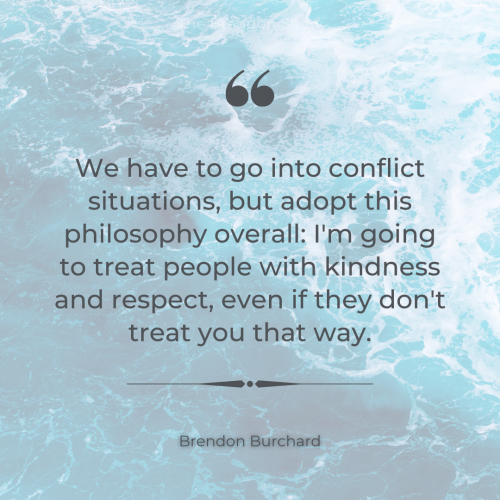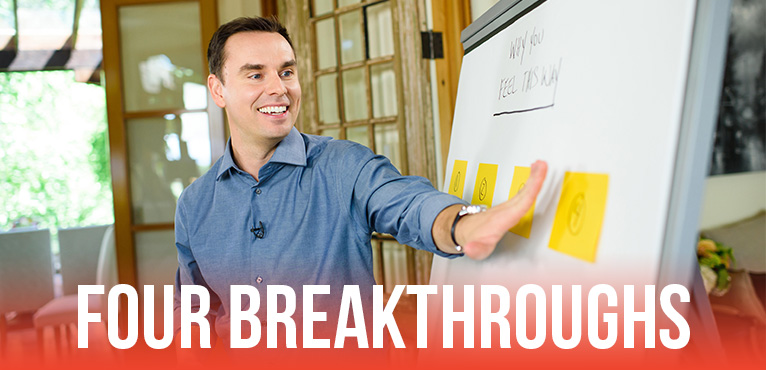SUMMARY
- “We have to go into conflict situations, but adopt this philosophy overall: I’m going to treat people with kindness and respect, even if they don’t treat you that way.”
- Conflict is a natural part of life, inevitable really. In this episode, learn how to manage conflict with tangible skills to better navigate those difficult situations.
- Next time conflict arises, listen to this episode and keep these three conflict-resolution phrases from Brendon at the forefront of your mind!
- Watch the video to get the full training.
- Already have the High Performance Planner and CRUSHING each and every day? Let’s celebrate you! Take a photo with your planner and use #GrowthDay so we can find you on social media!
HOT NEWS & DEALS!
-
Get the Confidence Masterclass
Stop letting limiting beliefs and lack of confidence hold you back! Learn the SKILLS of confidence from 9 of the world’s best personal development experts in the most comprehensive Confidence training ever created! $400 worth of training – just $7.99 today! Get the Confidence Masterclass!
-
Get the GrowthDay app!
Make self-improvement a way of life and get the GrowthDay app! GrowthDay features all your personal development tools, coaching and community in one place. Write your journal, track your habits, take wellness challenges, watch live influencers teaching new life strategies, and join a global community of positive and supportive high achievers excited to improve their lives! Get the app on Apple app store here. Get on Android here. Get desktop here.
DID YOU KNOW?
I give weekly prizes, gratitude and shout-outs to our students, so post a screenshot or video on Instagram and use #TheBrendonShow! I can’t wait to hear your thoughts about this episode!
RELATED POSTS
The 4 Steps To Better Health
Optimize Your Health And Productivity
Tips for Developing Close Relationships
The Friendship Masterclass
Nurturing Great Relationships

FULL TRANSCRIPT
[The following is the full transcript of this episode of The Brendon Show. Please note that this episode, like all TBS episodes, features Brendon speaking extemporaneously–he is unscripted and unedited. Filmed in one take, The Brendon Show has become one of the most viewed unscripted, direct-to-camera self-help series in the history of YouTube. It has also been the #1 Podcast in all of iTunes and is regularly in the top podcasts in the Self-Help and Health categories around the globe. Subscribe to the free motivational podcast on iTunes or Stitcher.)
1. Shared Future Mindset
I think this will help you be more intentional and more capable of handling those difficult conversations or moments in your relationship with your friends or your family, your loved ones, or your team in such a way that you are better equipped to handle the emotions, to honor the other people, and to move through it with a little bit more grace. So that’s our job today. If you ask me, “Brendon, help me manage conflict better for the rest of my life.” You get, you know, three phrases. Here is what they are. The first phrase is shared future mindset. Shared future mindset. You know, when we enter conflicts, it’s so often we get so myopic. We take things personally and we just want to win. So we want to just crush and trounce the other person and debate them and make them look dumb because our ego wants to be right and we forget we got to wake up with that person tomorrow morning. Maybe that’s your spouse. We got to go to work with that person again tomorrow because it’s Tuesday. We got to, you know, see that person again in our neighborhood. We got to… that person who we’re about to have a conflict with, they’re probably going to be there again. And once we can realize, oh, I’m entering the conflict, this is about to get heated up. We’re about to have some debate here or you’re already in it. If you can adopt the shared future mindset that, “oh, we’re going to share a future together, I’m gonna have to see her again. I’m gonna have to work with this person again. I’m gonna have to deal with this probably again and again through multiple more projects in the future”, everything will shift. You’ll approach the conversation differently more strategically, and more thoughtfully when you keep the future in mind.
And importantly, if we’re talking about a relationship or partner or spousal conflict, somebody who you really love, if the two of you have in mind, you know, a compelling future together, right? You have shared interests, shared goals, and shared adventures coming up. If you can always ground your relationships in the reality that you’re building something together, if that pre-exists, then moving into a conflict, you’re more likely to resolve it more quickly and amicably. Research shows that even just having a couple have a conversation about something they’re interested in doing or something good coming up in their future before having them talk out a difficulty makes that difficult or that conversation of conflict so much more smooth, so much shorter, so much less accusatory. It changes everything. Grounding ourselves in the future, I think is important.
2. Respectful Process
The second phrase I would say here is — respectful process, respectful process. Have you ever been in a conversation in a conflict and you were just trying to be thoughtful and try to be calm and the person you’re dealing with was not respectful? I mean, yeah, I’m sure a lot… of a lot of hands raised here in the room, at least as we’re doing this. It’s very, very frustrating. And soon as we lose respect in the conversation, you know, all is fair game in war. And so it’s a very challenging thing.
We have to go into conflict situations, but adopt this philosophy overall: I’m going to treat people with kindness and respect, even if they don’t treat you that way.
You know, for those who don’t know my background a little bit, this is a topic I really love because you know, if you don’t know my master’s degree was in communication studies, and I focus mostly on leadership communication. And I’ve done a lot of coaching as you know, over the last 15 years. I’m a certified high-performance coach. And over these 15 years, doing it full time every single week, a lot of times I’m dealing with conflict situations and couples or conflict situations between co-founders. And soon as it devolves into disrespect, it is ten times harder to pull it back. It is so much more difficult. And so you’ll hear me talk about how you can maintain that respectful stance with your partner or the person you have in conflict with, but also know that the expectation has to be had in advance of the conversation. Sometimes you react in the heat of the moment without stepping back and setting the frame for the conversation. As simple as if you feel hooked or triggered by saying, “You know, could we talk about this in like 30 minutes in a much more calm way? I just need to go reset.” And coming back with the expectation and the conversation —“Let’s try this again. I want to be more respectful with you. I know that we love and care for each other or I know that we need to work together or I know that it hasn’t been easy. So let’s try this again. Let’s try to do this with kindness and care for another. And we can solve this together. I know we can.” A simple reset into the frame of respect can change the outcome as well.
3. Empathy and Encouragement
And the third phrase, so the first phrase was shared future mindset. The last phrase was a respectful process. The third one is empathy and encouragement. Now, we all know about empathy, right? We all know we’re supposed to listen, understand, feel, and sense their thoughts and feelings. We’re supposed to reflect back on how they’re feeling and what they’re going through. We’re supposed to validate, maybe not their beliefs, but validate them as a person. We’re supposed to really feel their pain or walk in their shoes. You’ve heard these phrases before, right? Empathy, people know they should do that. But in conflict, common sense is not always common practice. And that’s why we really wreck relationships. And empathy is one of those. Being an empathetic listener. But notice the phrase empathy and encouragement. Do you know what in conflict also goes out the window? I said earlier, what goes out the window? Well, shared relationship and the future. Well, the ego also can’t see and validate and praise the other person, which is exactly what they need. We forget because we’re hooked or we’re upset or we disagree that the other person is, you know, if you’re a spiritual person, a child of God or the other person, you know has extraordinary potential, or the other person has been through a lot in their life, or the other person is struggling. And we forget that people actually need a lot of encouragement and you, I know being in GrowthDay, you tend to be the person who is more encouraging in your relationships. We know that from our research. You tend to be the person who’s usually more of the optimist or more of the leader position, that you’re the person who is supportive of others, more kind of others, and yes, more encouraging of others. But we forget that when we’re angry. Who’s guilty? OK, a few of us.
Think about the last argument you had with somebody. Did you praise them? Did you encourage them to share? Did you say a kind word? Did you appreciate something about them? Most people don’t. They’re on the attack. They’re on the offensive. They think they are at war and they must win at all costs. That’s the ego. That’s narcissism. That’s sociopathy. Do you know what it is? Because it’s saying, I must destroy this person because it’s a zero-sum game. Either they’re evil and I’m good or I’m right and they are wrong. And there is no in-between. And what that does is it objectifies the person into the category of darkness and bad, versus recognizing human frailty, and human suffering. It strips us away from that common humanity. And if we let that happen with every conflict situation, no wonder we live in a divisive world where it’s accusatory, where it’s blaming, where it’s the worst assumption about the other person, when in reality, what we really need to do is remember the human struggle. Remember their humanity. Just think about this—the next time you’re going to go have a strong or difficult or conflictual conversation with your partner or your spouse or someone you’re in a relationship with intimately, imagine if you just said, “OK, we have a shared future together. I’m going to respect him or her in this process, and I’m going to make sure I encourage them a little bit.” If you did those three things, if you entered it from those three frames, very different energy happens in that relationship, a very different one. So a lot of these themes are going to come up. Shared future mindset, making sure we have a respectful process and encouraging others. This will change everything. Everything.


